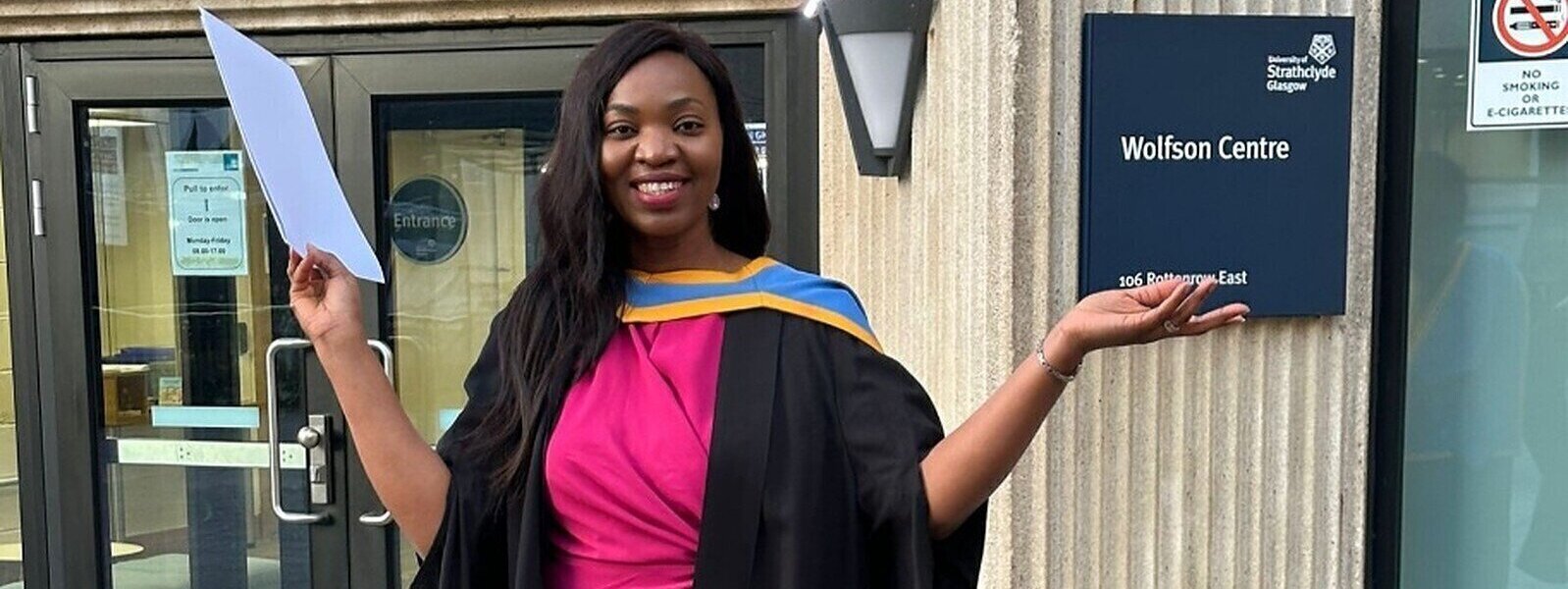
Adaeze, is a recent graduate from the MSc Diplomacy & International Security programme within Strathclyde's Department of Humanities
Tell us a little bit about your background...
I am from Nigeria. I have an undergraduate degree in law from the Houdegbe North American University in the Republic of Benin and a Masters degree in Law from the University of London. Prior to commencing my studies at Strathclyde, I worked as a mediator and a court administrator with the labour court in my country.
What inspired you to study the MSc Diplomacy and International Security?
With a background in law, I was initially drawn to the field of diplomacy and international security due to its inherent connection to global governance and the rule of law. Having studied a course in Public International law, I developed an interest in International relations and the intricate web of diplomatic relations between nations, and I wanted to deepen my understanding of these complex dynamics. Moreover, I recognized that in an increasingly interconnected world, traditional legal frameworks alone are not sufficient to address the multifaceted challenges we face today. Issues such as terrorism, cyber warfare, and human rights violations require a comprehensive approach that combines legal expertise with a nuanced understanding of international politics and diplomacy.
What were the most enjoyable parts of your course?
I enjoyed the weekly interactive seminars which encouraged students to engage in personal research and learning, these seminars offered an opportunity to interact and learn from classmates with diverse knowledge. Going through the weekly reading materials, carrying out personal research ahead of seminars and participating in class discussions and presentations were all aspects of the course which I found enjoyable.
The multidisciplinary nature of the course encouraged versatility ensuring that students could acquire knowledge from different field like law, history, politics, and international relations.
What specialist knowledge/professional skills have you developed whilst studying the course?
I have gained a deep understanding of the historical context and evolution of diplomacy and international security. Through in-depth analysis of historical events, treaties, and conflicts, I have acquired a comprehensive knowledge of the factors that shape diplomatic relations and global security today. This knowledge allows me to approach current issues with a well-informed perspective, considering the long-term implications and historical precedents.
Studying this course has equipped me with advanced research and analytical skills. I have honed my ability to critically evaluate primary and secondary sources, identify biases, and draw accurate conclusions.
I have developed the ability to construct coherent arguments and effectively communicate complex ideas in a clear and concise manner, both in written and oral form.
What do you think of the support available?
The support provided by both the Academic and Administrative staff has been outstanding. The staff were always hands-on with providing relevant information, organising events, and providing assistance when needed.
What would be your advice for prospective students considering applying for this course next year?
Studying an MSc in Diplomacy and International Security at the University of Strathclyde is worth it due to the highly informative nature of the course. I would advise prospective students to come with an open mind to learn something new from the modules available. Ensure to prepare ahead for seminars as this would help you understand the class discussions and ensure proper participation in class.
What are your ambitions for the future and how do you think your time at Strathclyde will help you achieve your goals?
One of my primary ambitions is to work for an international organization such as the United Nations or the International Criminal Court. These organizations provide a platform for addressing pressing issues such as human rights violations, armed conflict, and global security threats. I aim to actively participate in shaping policies and providing legal advice that can lead to positive change and resolution of complex international disputes. I would also like an opportunity to work as a diplomat for my country's foreign affairs ministry. This role would allow me to represent my country's interests abroad, engage in diplomatic negotiations, and contribute to the development of international treaties and agreements. By utilizing my legal expertise, I can ensure that my country's foreign policies are aligned with international legal frameworks and contribute to maintaining peace and stability in the global arena.
